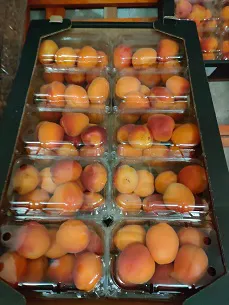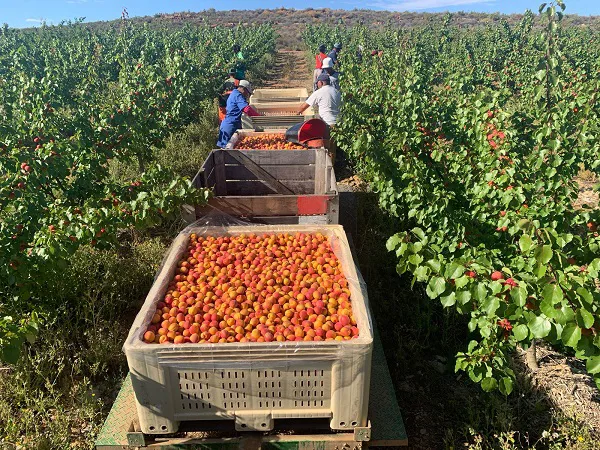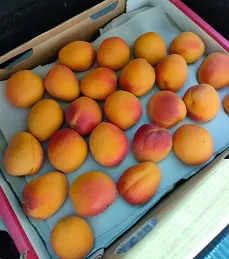The Carmingo® apricot range, bred by International Plant Selection (IPS) in France, is managed in South Africa by stonefruit specialist Michael Oosthuizen. He also works with Zaiger Genetics and Ibergen, as well as consulting for the Custom Plum Company programme. Four of the Carmingo® series are commercially planted in South Africa: Faralia (right), Farely, Farbaly and Farlis. The harvest of last-ripening of the cultivars, the Farlis, started earlier last week, neatly following on the Faralia which ended the week before. Despite hail damage it's been a very good crop this year, he says.
Four of the Carmingo® series are commercially planted in South Africa: Faralia (right), Farely, Farbaly and Farlis. The harvest of last-ripening of the cultivars, the Farlis, started earlier last week, neatly following on the Faralia which ended the week before. Despite hail damage it's been a very good crop this year, he says.
Domestic prices for apricots are very good – consumers don’t expect to be still finding apricots on the shelf – but Carmingo® apricots are grown exclusively for export to mainly the UK at the moment.
“The interest in these apricots is very high. Farmers with these apricots in the Koo Valley have told me they plan to completely take out their apples in future because apples are just outperformed by the Carmingo® apricots,” Michael notes.
Likewise plums, whose prices regularly come under pressure during the peak season when Carmingo® apricots can earn as much as R200 (11.5 euro) per 4.6kg carton more than plums.
Last year frost did heavy damage to the Carmingo® crop on some farms and, along with the ever-present threat of hail, nets have become non-negotiable on such a high-value crop which, Michael points out, can pay for the capital costs of erecting net structures with one season’s export earnings.

Evaluation of earlier-ripening Carmingo® underway
“We started with the late cultivars because that where the biggest opportunity is for South African growers, but we’d like to work our way back to the earlier cultivars which start ripening from November,” he says. There is a gap from November until middle-January to be filled. Evaluation of the Carmingo® Mediabel apricot, which ripens in early December, has started. “The Carmingo® series is making quite a big impact on the industry. In South Africa it’s primarily grown in the Koo Valley where it’s highly successful, starting around 15 January. Farmers realise it is very exclusive because it doesn’t work in all areas – it needs a sufficiently cold winter, so they go the extra mile.”
“The Carmingo® series is making quite a big impact on the industry. In South Africa it’s primarily grown in the Koo Valley where it’s highly successful, starting around 15 January. Farmers realise it is very exclusive because it doesn’t work in all areas – it needs a sufficiently cold winter, so they go the extra mile.”
Carmingo® apricots are also planted in the Koue Bokkeveld, Touwsrivier and close to Uniondale and in the Langkloof. The earlier Carmingo® cultivars are being evaluated in Barrydale and Ladysmith where the winters aren’t cold enough for the later-ripening types.
The first South African crop from the Rubyngo® series - fully red apricots which are set to revolutionise the apricot industry, according to IPS – will next year bear its maiden crop. “Its size, its shelf life and its eating quality are excellent,” Michael says. He was formerly a plant evaluator at the Agricultural Research Council who’d overseen the release of 45 stonefruit cultivars during his tenure. “The Rubyngo® are much firmer than other apricots.”
Prerotea, an early apricot, will have its first commercial crop next season: it’s also a Carmingo but so far only commercialised in South Africa on a Koo Valley farm by the name of Protea. The cultivar ripens at the end of November, very early in the South African apricot calendar.
Tremendous demand for red-fleshed plums
Michael's involvement with other plum breeders like Zaiger Genetics and Ibergen focuses squarely on red-fleshed plums whose antioxidant levels, some research has shown, surpasses the antioxidant levels of all other fruit, including blueberries.
Zaiger’s Ruby Dawn (ripening at the end of November), Ebony Rose (mid-December) and Honeypunch (mid-January) have found firm foothold in the local industry.
Michael’s eyes are on fifteen red-fleshed baby plum varieties bred by Spanish breeder Ibergen and currently still in quarantine in South Africa, soon to be released.
“Its eating quality is phenomenal. I encountered them at Fruit Attraction last year where a buyer from one of the top UK retailers was telling me she was ecstatic about them.”
He remarks that a tremendous demand for red-fleshed plums has developed over the past few years, driven by its antioxidant capabilities.
South Africa could grow all its needed almonds in 2 years
Almonds are another health food that Michael helps establish in South Africa, as part of the Unlimited Nuts, which is like the Custom Plum Company also part of the Unlimited Group. He reckons South Africa will be self-sufficient in almonds in about two years’ time.
Almond orchards have been planted almost everywhere in the Western Cape, with an epicentre around Robertson, Oudtshoorn and going right up to Douglas, by the Orange River.
There is a lot of interest from Gauteng in planting almonds (although drying the nuts during the summer rainfall period could be more complicated than leaving it out for three days to dry in the sun in the Western Cape where, at the time of speaking, it was 40°C).
Michael, who also sources nuts for a health food company called So Natural, notes limited success in procuring cashew nuts in the subregion.
For more information:
Michael Oosthuizen
International Plant Selection
Tel: +27 83 228 9348
Email: toyoosth@iafrica.com
So Natural
Estrela: +27 83 474 1230 Matthew: +27 73 384 7768
Email: toy@sonatural.co.za
http://sonatural.co.za/
